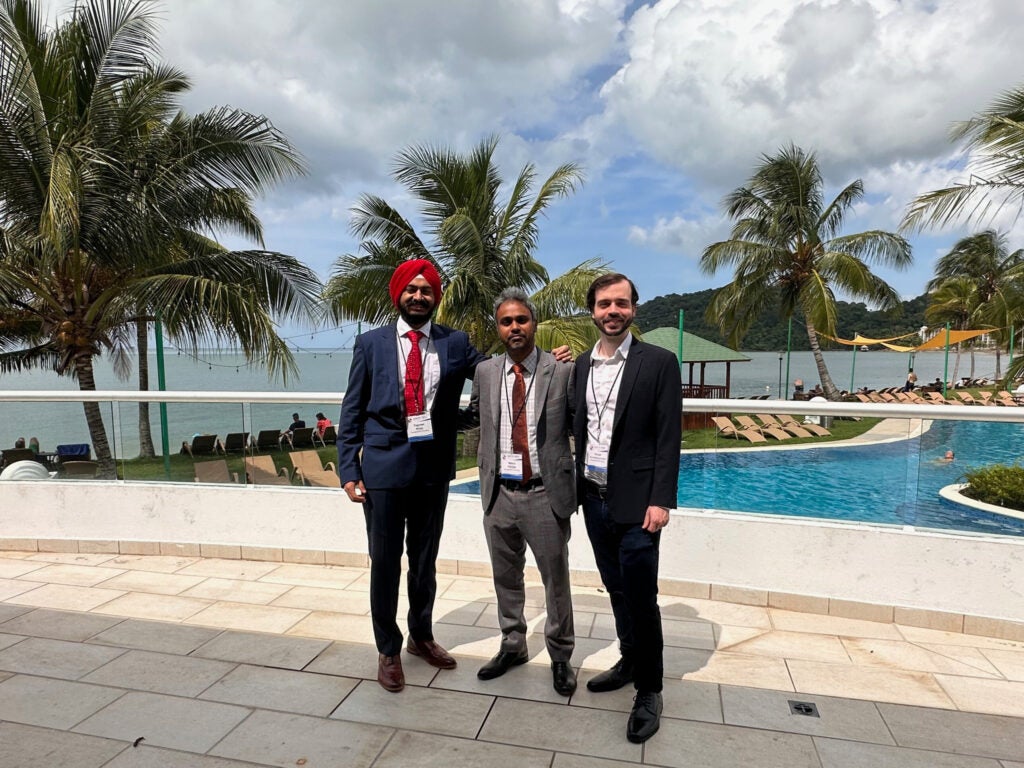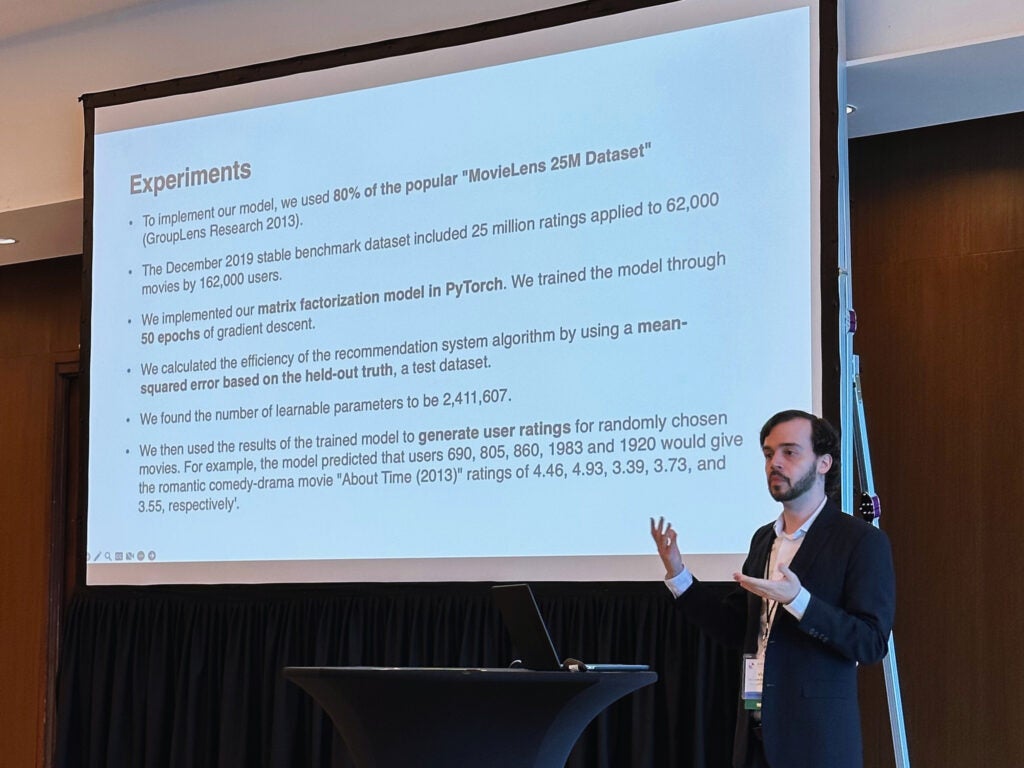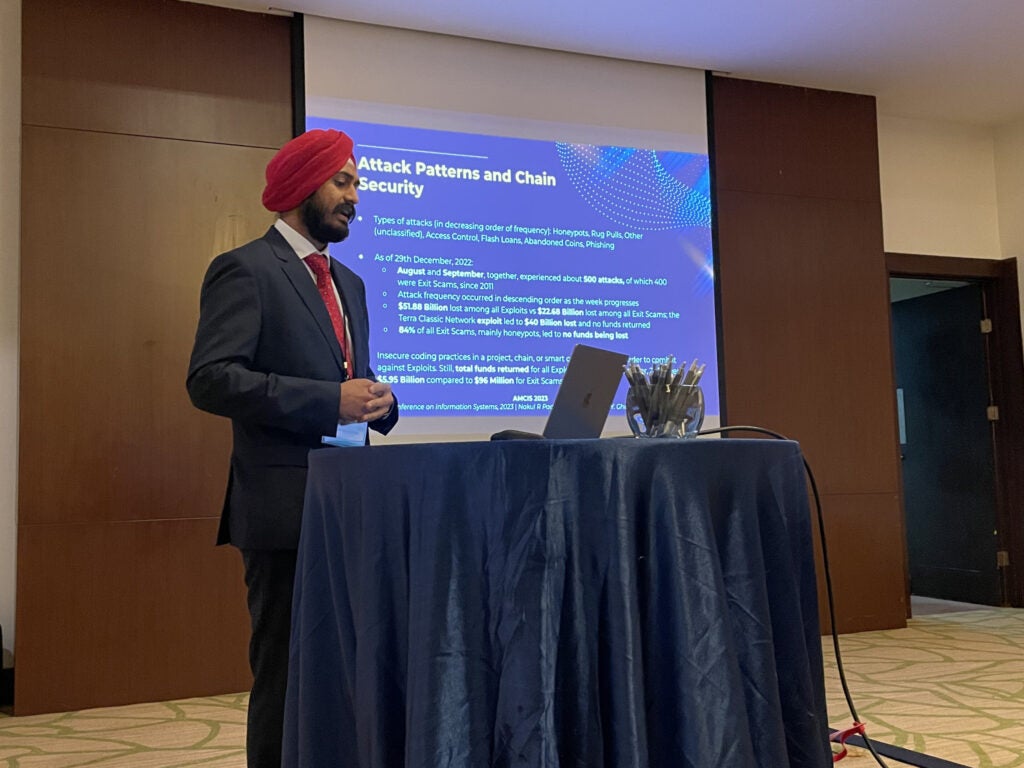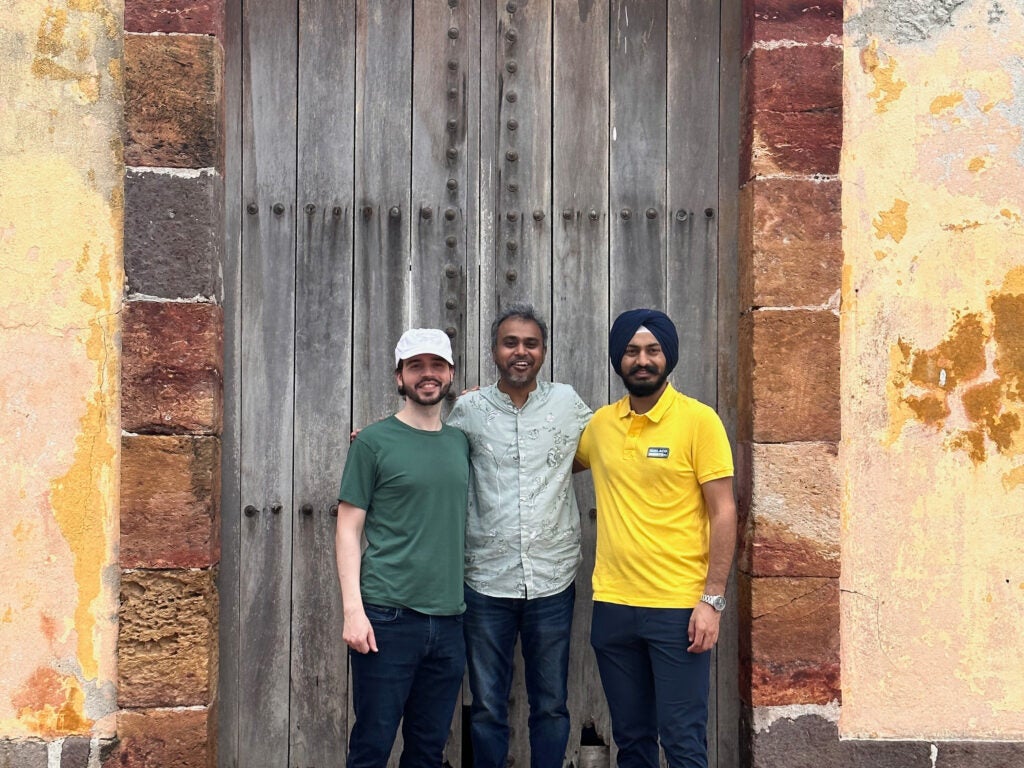DSAN Students Stand Out at AMCIS Conference in Panama City
In August of this year, DSAN Assistant Teaching Professor, Dr. Nakul Padalkar and DSAN students Tegveer Ghura (‘24) and Victor De Lima (‘24) traveled to AMCIS in Panama City, Panama, representing the DSAN program and Georgetown University.

The annual Americas Conference on Information Systems (AMCIS) is one of the leading conferences for presenting the broadest variety of research done by and for IS/IT academicians. Every year its papers and panel presentations are selected from over 700 submissions, and the AMCIS proceedings are in the permanent collections of libraries worldwide. The 2023 conference primarily focused on the social aspects of artificial intelligence (AI), cryptocurrencies and blockchain, augmented reality (AR), virtual reality (VR), robotics, and the Internet of Things (IoT).
Dr. Padalkar shares, “I passionately enjoy the exploration of Blockchain and Artificial Intelligence technology for industry and social use. Under the umbrella of “Disruptive Technology Group,” with Tegveer and Victor, we had constructive conversations about these technologies and their use. I was also able to chair two sessions on Artificial Intelligence and Autonomous Applications. This year, the group had multiple presentations on Generative AI, and Victor’s research was a perfect fit for this group.”
Victor opens up about the lasting impact of his participation:
Attending the AMCIS 2023 conference was a profound experience for me. The event provided an illuminating exploration of emerging technologies such as Artificial Intelligence, cryptography, and IoT, which substantially impact modern society. It offered an opportunity to grasp these technologies’ growing uncertainty and vast possibilities. More personally, the journey of writing the “Recommendation Systems with Causal Inference-based Regularization” paper with Professor Nakul and navigating the publishing process was a unique and enlightening experience. Collaboratively exploring the connection between causal inference and recommender systems, we ventured into new research territories. The countless hours of brainstorming, experimentation, and dealing with the challenges of running a 2.4 million-parameter model were demanding. However, they provided a steep learning curve that significantly expanded my understanding of the subject.

As we presented our findings at the conference, the feedback from peers and experts validated our efforts and broadened our perspectives. Although daunting at times, the publishing process was a valuable learning experience that provided insights into academic rigor and collaboration. Connecting with prominent figures in the field was a standout experience. Engaging in discussions with esteemed scholars and industry pioneers led to a deeper understanding of the field’s current trends, challenges, and opportunities. These interactions enriched our understanding, fostered collaboration, and left us with a lasting impression of the dynamic intersection of academia and industry.
Dr. Padalkar highlighted that “the cryptocurrency and cybersecurity research with Tegveer highlights our work on building ML applications for CySec and Crypto research. His research invited a detailed discourse on how we can use ML algorithms to detect specialized attacks on the Ethereum blockchain.”
Tegveer paints a picture of his experience:
Even before stepping on campus, I knew I wanted to interact with Dr. Nakul when I first learned about his blockchain course, a financial domain in which I had much interest but no experience. I decided to explore DEFIYIELD’s REKT Database as my project in our machine learning class, DSAN 5000. When I told him about my DSAN 5000 Final Project, he guided me through the research pipeline, carefully crafting my understanding of the publishing pipeline. His guidance helped me improve the data analysis by applying it to the real world.

It was late November 2022 when Dr. Nakul proposed I submit the paper for a conference presentation. I vividly remember entering his office, and, out of the blue, I was met with a proposal to publish a paper that I could not forego! He was set on submitting to the 2023 AMCIS event. After gathering his initial thoughts about the paper’s motivation, I immediately got to work and read research papers about blockchain that he recommended. Although the class project did encompass classification algorithms, the paper we published was fairly unique to the class and the conference.
We employed Logistic Regression and Random Forest algorithms, which were not used in the class project on the REKT Database, containing 3,163 records about scams that occurred on open blockchain platforms. Our primary goal was to highlight the preemptive prediction of these scams (with prevention as the final aim). The predictive aspect of the research would assist decentralized and centralized exchanges in classifying the scam type and proactively monitor (and eventually stop) a token on their platform if it is deemed nefarious. Future research would include augmenting the current dataset with more attacks recorded by other organizations and cleaning tokens’ data from the original database to achieve our primary goal.
At the conference, Dr. Nakul introduced me to friends, mentors, and distinguished professors. We were also able to join industry panels from leading technology leaders in manufacturing, technology, and operations. In discussions with the distinguished professors from R1 schools, Victor and I learned more about the characteristics of the doctoral program and the traits of Ph.D. programs and discussed our previous and ongoing research projects and Ph.D. applications.
I left Panamá with a wealth of new knowledge and lasting memories! I would recommend that incoming students not miss this opportunity, if given, to understand better academia, research, teaching, and industry applications of technology. The conference also helped us build several connections, increasing our research prospects and fueling ideas for future endeavors.

A Memorable Experience
Dr. Padalkar shared that, “showing Tegveer and Victor around Panama was one of the trip’s highlights, enhancing our experience beyond the conference. We were captivated by the contrasts between old-world architecture and modern vitality while exploring Panama’s old city (and took several pictures for the Computer Vision class!). We attended a coffee tasting at Cafe Unido, where we learned about Panama’s coffee culture. Additionally, our visit to the iconic Panama Canal allowed us to appreciate the remarkable engineering behind this famous landmark. Sampling various local restaurants allowed us to try Panamanian cuisine’s diverse and unique flavors. These shared experiences strengthened our friendship and added a personal dimension to the professional connections we made at the conference. I am looking forward to building research streams with both students. Seeing them collaborate was amazing, highlighting the camaraderie between Georgetown students.”